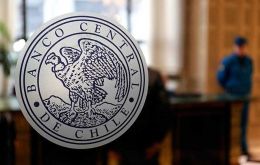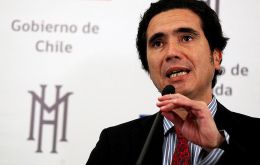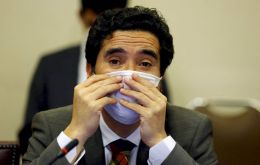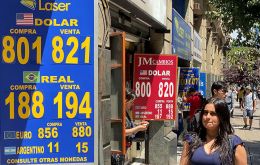MercoPress. South Atlantic News Agency
Tag: Ignacio Briones
-
Thursday, August 13th 2020 - 06:57 UTC
Chilean central bank allowed to buy treasury bonds, as “a tool of exceptional use”

Chile’s Congress has approved a law to allow the central bank to buy bonds issued by the country’s treasury in the secondary market, potentially giving the bank added firepower to help offset fallout from the COVID-19 crisis.
-
Thursday, July 2nd 2020 - 11:31 UTC
“Monumental” plunge of economic activity in Chile during May, 15,3%

Chile's economic activity fell by 15.3% in May from the same month a year ago, the central bank said on Wednesday, hitting yet another historic low as measures to contain the spread of the coronavirus left many out of work and businesses shuttered.
-
Wednesday, June 17th 2020 - 08:35 UTC
Chile's government agrees with opposition US$ 12bn stimulus package

Chile’s government reached a deal with opposition lawmakers for a US$ 12 billion stimulus package over the weekend as infections hit a record and the health minister quit.
-
Saturday, June 6th 2020 - 13:18 UTC
With economic activity plunging in Chile, consumer prices fell 0.1% during May

Chilean consumer prices fell 0.1% in May, the government’s statistics agency INE said on Friday, as costs of many goods and services stagnated amid the growing coronavirus outbreak in the country.
-
Monday, May 18th 2020 - 07:08 UTC
Two Chilean ministers and 23 lawmakers under quarantine

Two of Chile´s top Cabinet ministers said on Sunday they would quarantine after coming in close contact with Chilean lawmakers who tested positive for the coronavirus during negotiations in Congress.
-
Thursday, May 7th 2020 - 12:58 UTC
Chilean economy contracts 3.5% in March over a year ago

Chile’s economic activity dropped 3.5% in March from a year earlier, the central bank said. The bank’s IMACEC economic activity index declined 5.7% compared with the previous month, as the country went into an economic and social shutdown after the arrival in Chile of the new coronavirus.
-
Friday, November 15th 2019 - 09:50 UTC
New record high for the US dollar in Chilean markets: 820 Pesos

Chile's central bank announced a US$ 4 billion injection to stop a currency slide that saw the peso reach historic lows on successive days this week. The peso fell to 820 to the dollar at the close Thursday, breaking the 800 Pesos milestone.
-
Wednesday, November 13th 2019 - 09:49 UTC
Protests continue in Chile as economy faces “grave consequences” and Peso plunges to a historic low

Chile’s finance minister warned on Tuesday of the “grave consequences” for the nation’s economy of three weeks of often violent unrest after the peso slid 4% to hit a historic low against the dollar. Ignacio Briones said the weakening of the peso was a “sign of worry” that he and his colleagues were watching very carefully.
